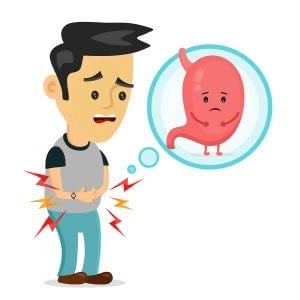Does your child easily stress out? Is your child always anxious? Is your child a perfectionist? Do you worry that your child is going to get an ulcer?
What Is an Ulcer?
An ulcer is an open, painful sore in the digestive tract. Ulcers in the stomach are called gastric ulcers, and ulcers in the first part of the small intestine are called duodenal ulcers. Both gastric ulcers and duodenal ulcers are referred to as peptic ulcers.
What Causes an Ulcer?
For years, doctors used to think that stress caused ulcers, but now we know that is not true. In 1982, Dr. Marshall and Dr. Warren received the Nobel Prize for discovering a certain bacteria in the stomach that causes ulcers. Most ulcers in children are either caused by a bacteria called Helicobacter pylori(H. pylori) or by medications known as nonsteroidal anti-inflammatory drugs(NSAIDs) such as Ibuprofen, Advil, Motrin, and Aleve. Both H. pylori bacteria and NSAIDs weaken the lining of the stomach and the upper small intestine. This allows stomach acid to irritate and erode the digestive tissue leading to an open, painful sore. Doctors are not entirely certain how children contract an infection with H. pylori bacteria. H. pylori may be spread by contaminated food or water, or through saliva.
Symptoms of an Ulcer
 Most ulcers cause sharp, burning pain between the breast bone and belly button. The pain can occur with eating, hours after eating, or in the middle of the night. Sometimes, eating can actually help relieve pain from an ulcer. Other symptoms of an ulcer include:
Most ulcers cause sharp, burning pain between the breast bone and belly button. The pain can occur with eating, hours after eating, or in the middle of the night. Sometimes, eating can actually help relieve pain from an ulcer. Other symptoms of an ulcer include:
- Nausea
- Vomiting
- Loss of appetite
- Weight loss
- Blood in the vomit or bowel movement (poop)
How to Diagnose an Ulcer
If your child’s doctor is concerned that your child may have an ulcer, the doctor may order certain tests:
- Stool test to check for pylori bacteria
- Breath test to detect carbon break down by pyloribacteria
- Referral to a specialist for an upper endoscopy to visualize the ulcer and pylori bacteria
Note that blood testing for H. pylori in children is not accurate and is not recommended.
What Is the Treatment for an Ulcer?
Most ulcers are easily curable with medication. The treatment involves:
- Medication to lower acid production for approximately 2 months
And
- Antibiotics to eradicate pylori bacteria for approximately 1–2 weeks
And
- Stopping or changing NSAIDs
Caffeine can stimulate the production of stomach acid and make an ulcer worse, so it is important to stop the consumption of sodas, teas, coffee, energy drinks, and chocolate.
How to Prevent an Ulcer
Preventing infection with H. pylori bacteria can help reduce your child’s chance of developing an ulcer. Even though it is not completely understood how H. pylori is spread, some things that may prevent infection include:
- Hand washing before and after eating and after using the restroom
- Avoid sharing utensils and drinks with others
- Avoid contaminated water and food
- Avoid close contact with someone infected with pylori bacteria
Remember, stress does not cause an ulcer. However, if you think your child has other symptoms that could indicate an ulcer, then speak to your child’s doctor about your concerns. If you would like more information about ulcers and gastrointestinal (GI) digestive disorders and nutrition in children, please contact Dr. Mona Dave’s Plano Office or Southlake Office.

